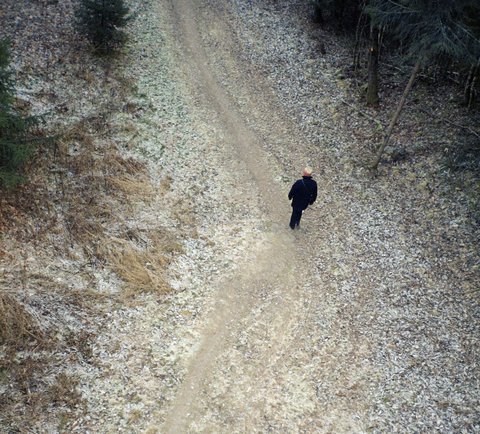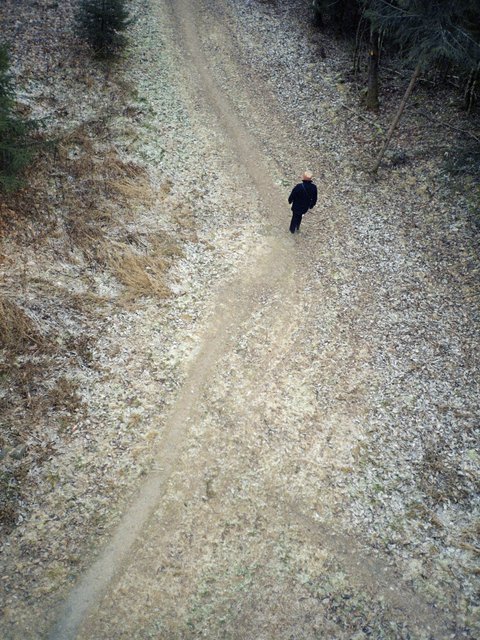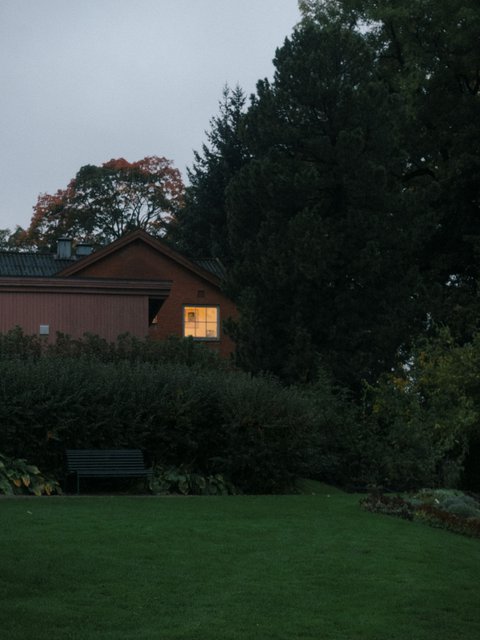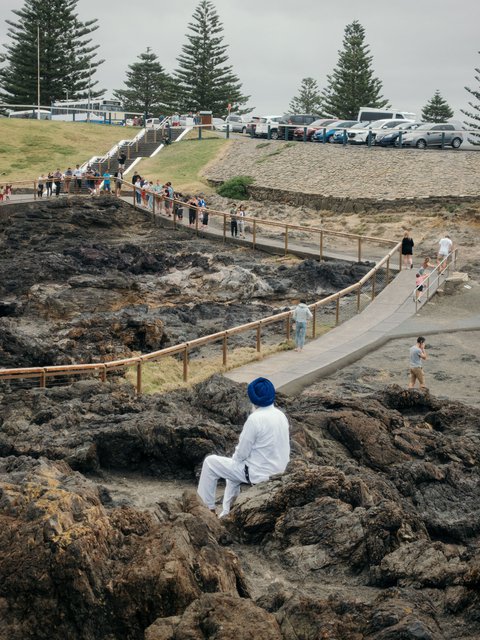If, according to Christoph Ransmayr, it is possible for the world to become bigger rather than smaller through travel, it must also be possible for the world to become more communal rather than more lonely through the isolation of the last two years. Benedikt Kristjánsson will conclude his residency at the Beethovenfest 2022 by singing Franz Schubert’s Winterreise for twenty-four hours, one night and one day, after his trio performance of the St. John Passion and his JUDAS project. The concert evening on 10 September 2022 will begin at the Viktoriabad in Bonn with a first run-through of Winterreise, initially together with pianist Fabian Müller. The first round will be followed immediately – and without a break – by a second, then a third, a fourth and so on. Finally, on the following Sunday at six o’clock in the Kleine Beethovenhalle, Kristjánsson will sing a final Winterreise, again with pianist Fabian Müller.
#essay Johannes Petrat
Journey into the self

From the second performance of Winterreise, Kristjánsson stands alone on the stage and sings on and on. He denies the audience the opportunity to applaud and leave properly, recalling the scene in Miloš Forman’s »The Moon Man« when anti-comedian Andy Kaufman reads the entire Great Gatsby by F. Scott Fitzgerald to his audience instead of a stand-up routine. In the film, the audience initially thinks that the uninterrupted reading is a joke and must end soon, until, after a cut to the early hours of the next day, it is revealed that only a handful of people are still half asleep, half huddled, listening to Kaufman’s final sentences. Most of the audience has disappeared, and a tired round of applause ends the reading, ends the night. The evening at Viktoriabad could be similar, except that for Benedikt Kristjánsson the last song and the last verse are always a new beginning.

Welch ein thörichtes Verlangen
Treibt mich in die Wüstenein?
What a foolish desire
Drives me into the deserts?
Kristjánsson will not leave the stage during the night. There will be a ten-minute break every hour, and there will be a toilet on stage. This kind of self-illumination, comparable to the innermost processes of falling in love or dying, is an exhibition of the most discreet moments. An audience is not normally intended, which is an impressive interpretation of the concept of contemporaneity. Twenty-four hours thus becomes a journey into the self in which nothing is certain. The only certainty is that Kristjánsson will leave for the exile of the night.
Eine Straße muß ich gehen,
Die noch Keiner ging zurück.
One road I must go,
That no one has gone back yet.
After a few hours of uninterrupted singing in Viktoriabad, Kristjánsson leaves the concert hall the next morning without stopping. What happens next is in direct contrast to the nature of a lieder concert: Benedikt Kristjánsson will at some point sing alone and be alone. The song is deprived not only of its communicative basis, but also of its pleasurable one, as exhaustion sets in. The singer no longer sings to enjoy himself, but to sacrifice himself.
So zieh’ ich meine Straße
Dahin mit trägem Fuß
So I take my road
Thither with sluggish foot
In a short mobile phone video, Kristjánsson speaks of a »transformation« that will take place at the end of the twenty-four hours. One wonders whether he means the transformation of his voice or the transformation from audience to emptiness, from evening to night to day, from joy to exhaustion. Kristjánsson walks as one of many, eight kilometres from the Viktoriabad to the Kleine Beethovenhalle, eight kilometres alone in company.

Was soll ich länger weilen,
Bis man mich trieb’ hinaus?
Why should I stay longer,
Until I am driven out?
No one knows if they will pass a lime tree, a post office or an inn, or if they will see the lyre player at the end. Will the exhaustion that sets in be a burden or an ease? For the singer, the unknown terrain of total exhaustion is a game with his own destruction, because the problem with beautiful things is that they eventually stop. Because if they don’t stop, beauty turns into madness – moments when things get interesting.
Failure as an opportunity,
and the stars shine.
Total exhaustion and waste became a new artistic force, a new phase in his work, expressing the necessary loneliness of man. Loneliness is not a sudden feeling, but a highly comparative one. Loneliness needs memories of togetherness, of plurality, or of an audience, and the resulting sense of loneliness and loss. Ultimately, loneliness is like a mirror – without someone to look into it, it would remain empty.

Vom Abendroth zum Morgenlicht
Ward mancher Kopf zum Greise.
From evening red to morning light
Many a head became grey.
Kristjánsson’s Winter Journey stands in the tradition of an old, pre-romantic solitude, in which the focus is not on a fate of loss, but rather on solitude as a chosen path to the self. The old concept was the planned and deliberate retreat, the best known form of which is the hermit. His nature is silence, his movement is flight. When asked in the Beethovenfest podcast bee.contemporary why he wanted to sing Winterreise for twenty-four hours and what the meaning was behind it, Kristjánsson was unable to give a proper answer because he himself does not yet know what will happen. However, what often bothers him about performances of Winterreise is that a »wealthy singer in a tailcoat with a wine glass« performs Schubert’s harrowing music without creating the slightest sense of shock. Instead, Kristjánsson removes the boundaries of the work and immerses himself in it. He applies the concept of immersion, so popular in museum exhibitions these days, by exploiting Schubert’s concern with the experience of loneliness, because loneliness is not created in seventy minutes.
Soll denn kein Angedenken
Ich nehmen mit von hier?
Shall then no memory
I take with me from here?
This will put the motto of Beethovenfest 2022 to the test. »All people« will not be able to accompany Kristjánsson. »All people« will not sing at the same time, Winterreise is not a choir, but »all people« will have the opportunity to witness a transformation. If the audience decides to leave the singer alone, it will be transformed in its composition. Artist and audience will probably be confronted with the same feelings of lack of concentration and exhaustion, euphoria and redundancy, fraternisation and isolation, which are all part of the human experience. The fact that twenty-four hours can mean an entire human life is all too seldom realised. No one recognised this better than James Joyce, exactly one hundred years ago, whose Ulysses is set in the same unit of time as Kristjánsson’s solitary journey. At the end of this day and night narrative, this book of journeys and transformations, is Molly Bloom’s long final monologue with the life-affirming »Yes«. We can only wonder what the twenty-four hours of Winterreise will tell Kristjánsson.
»I was there!« is the sentence that will one day be said about Kristjánsson's Winterreise in Bonn.
Und Morgen früh ist Alles zerflossen. —
And tomorrow morning everything will have melted away. –
This article was written for the 2022 programme book and was first published there.